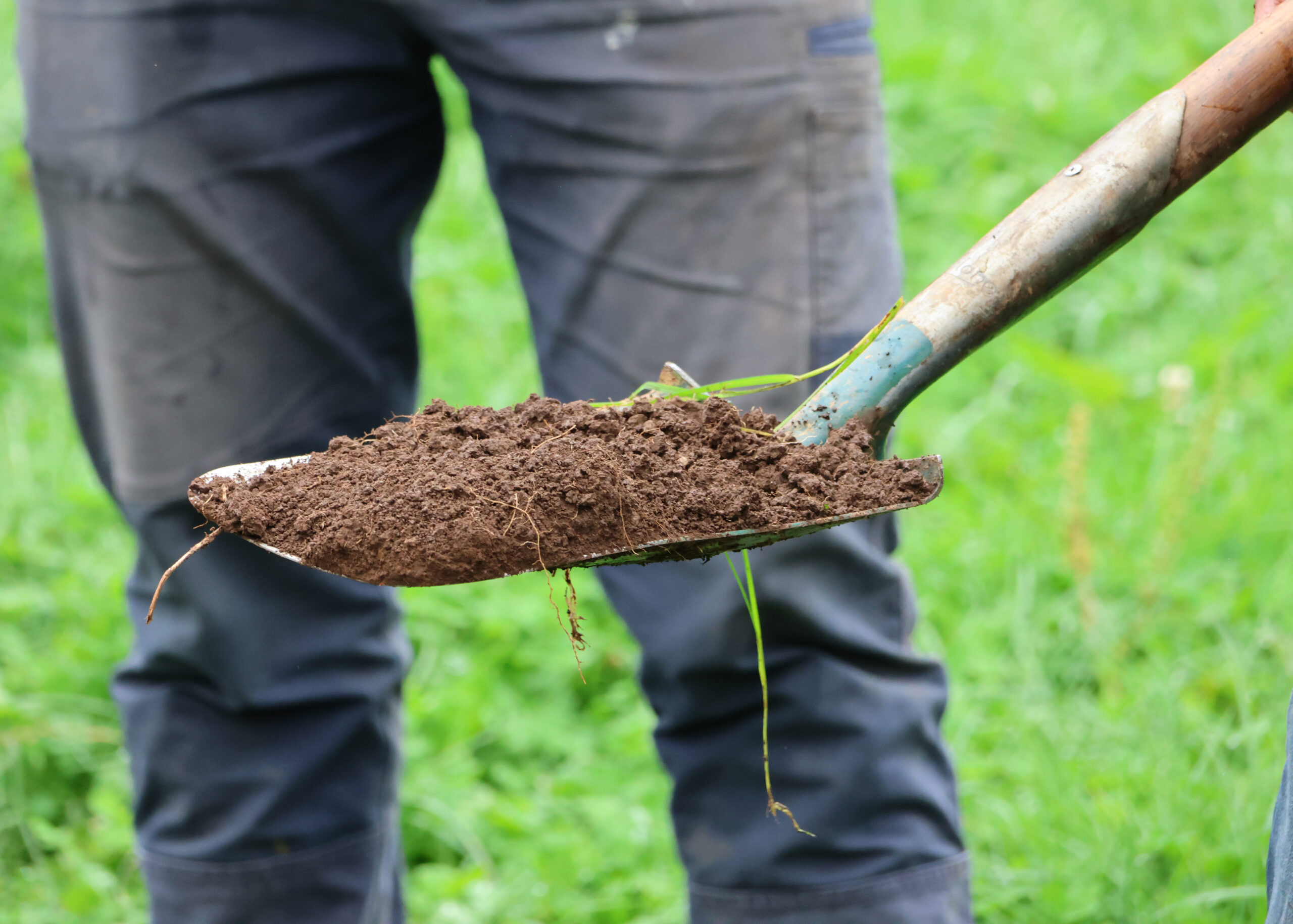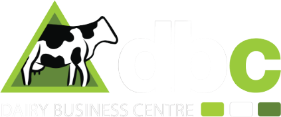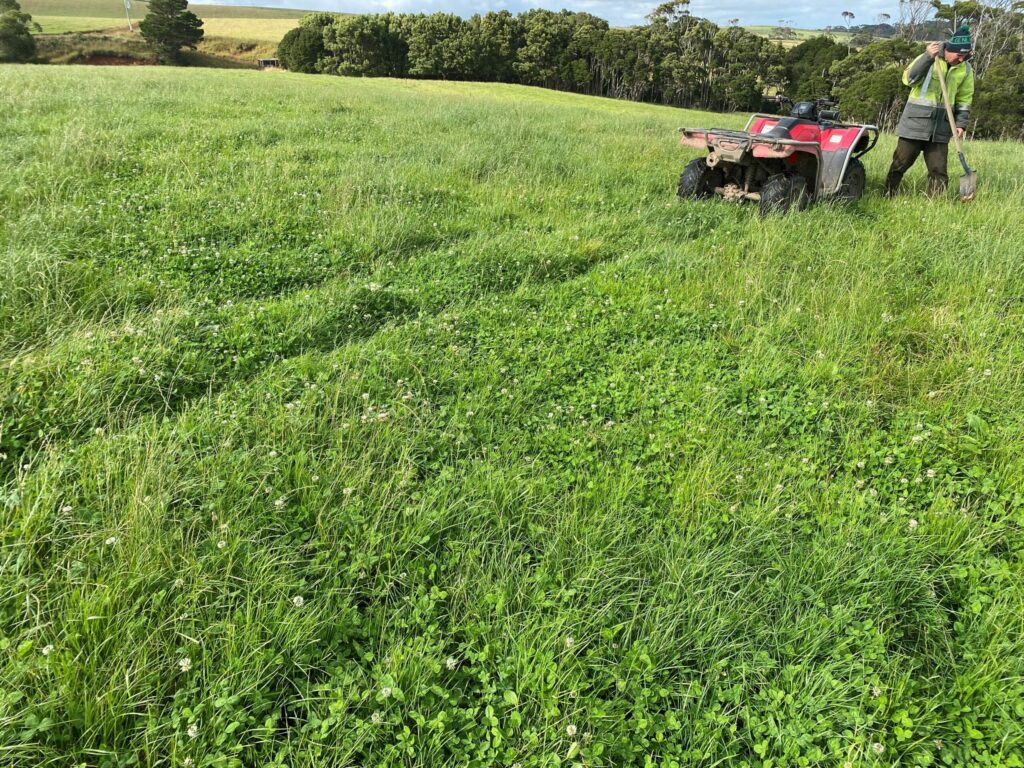Having a veterinarian in the family makes biological farming conversations a little more interesting for Isaac and Angelique Korpershoek.
The couple milks 350 cows at Forest in Tasmania’s north west, averaging 620kg milk solids per cow, with an average somatic cell count (SCC) of less than 100,000.
The Korpershoeks have always been committed to driving forward, and took ownership of their operation when they were young (see box story) – complete with the blood, sweat, and tears that comes with that decision.
Today, the parents of four children stand as a shining example on many levels – not least for their solid teamwork. The milking platform is 162 hectares (400 acres) with two run-offs that add 271ha (670 acres) to their complete 405ha (1070 acres) holding.
When they first discussed switching to biological farming a decade ago, Isaac was “curious”, while it challenged Angelique’s initial vet-driven impulse to look for the evidence-based science. Working as a Milk Quality Specialist for Saputo, Angelique is also a director of DairyTas, in addition to her commitments to the family’s dairy business.
Their nutritionist Dan Huggins, of Maxi Cow Consulting (affiliated with Dairy Business Centre Australia), was achieving encouraging results using biological practices on his own property, and Isaac and Angelique decided they wanted to know more.
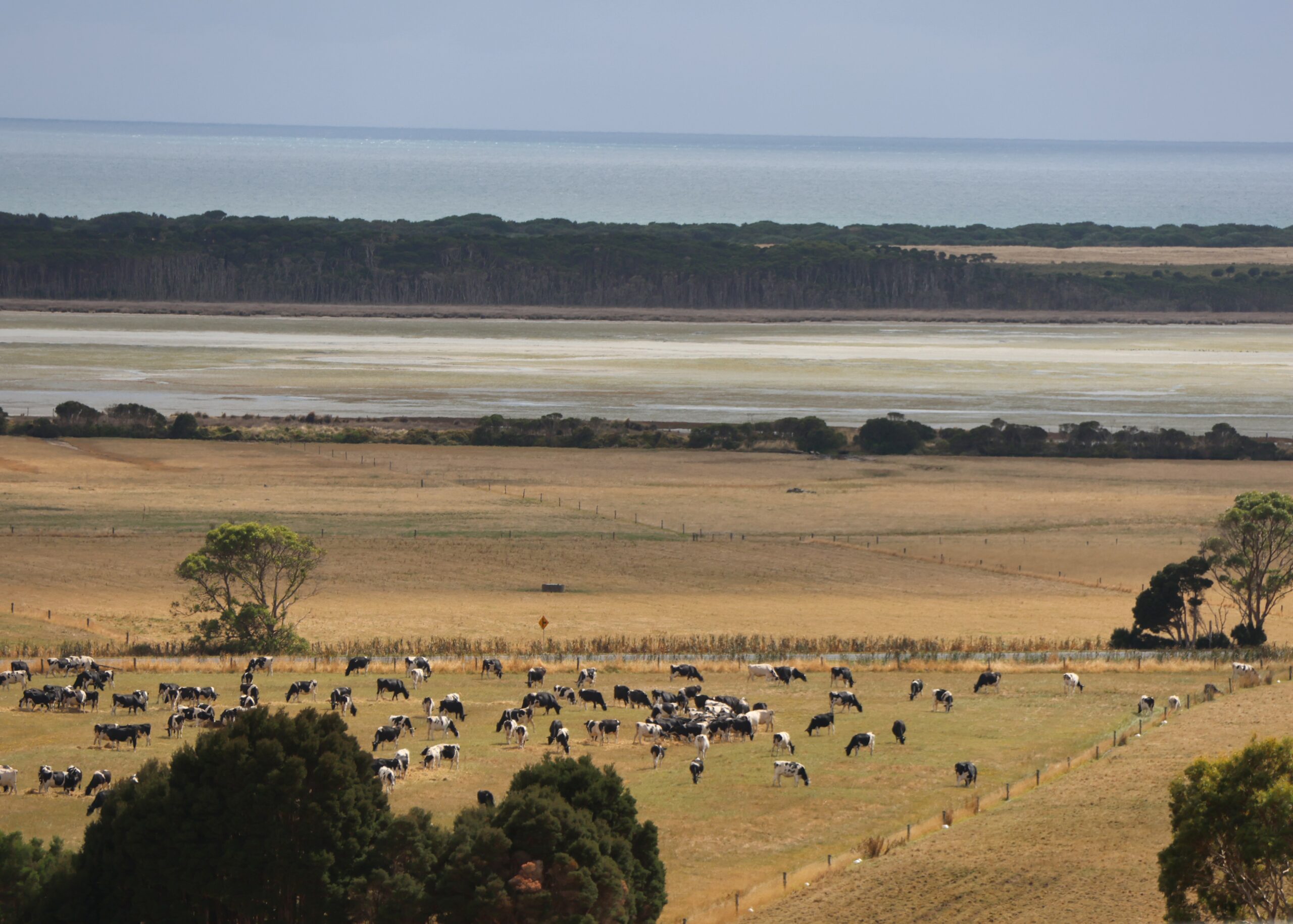
CHALLENGING PROTEIN PERCENTAGE IN EARLY LACTATION
At the time, they were struggling to get their protein percentage above 3% during early lactation.
Isaac said, “We were just at that point where you can only adjust so much in your grain ration. Dan started changing things on his own property, and I was starting to think that we couldn’t continue putting nitrogen on at 400kg/ha a year.
“Dan was referring to urea at that time as the ‘white drug’. It’s 100% true, because when we used it, we would see an instant response, but the grass never had any real density.
“When I put urea on, I’d mention the cows were fidgety, and Dan would say, ‘you’ve hit the farm with urea, haven’t you?’. Just because you think the farm needs it, doesn’t mean it’s the right thing for the cows. It made sense that we need healthy soils to have healthy cows.”
FACING THE FUTURE
The Korpershoeks decided to do a comparative trial in 2013. While they said they couldn’t risk compromising production by going all in, they could see the writing on the wall.
Angelique added, “Sustainability is incredibly important, and I don’t think we can continue farming into the future without considering that.”
Isaac finishes: “It will be forced upon everyone eventually, so we decided we were better to adapt in our own process rather than have it forced upon us down the track.”
Angelique had her own reasons for getting on-board.
“I guess with my experience, I feel that we shouldn’t be practising medicine without evidence-based science, and we shouldn’t be farming without an evidence base as well.
“But I’m also conscious that those who lead in nearly everything, do something different because they aren’t happy with what’s happening, or because it doesn’t feel right.
“Those leaders are often a little bit ahead of the science because science takes time. There is research around soil and human health, but we just don’t yet have the research connecting it to cow health.
“What we were proposing was what any good home gardener would be doing with their vegetable patch. The difference was we were going to do it on a commercial scale.”
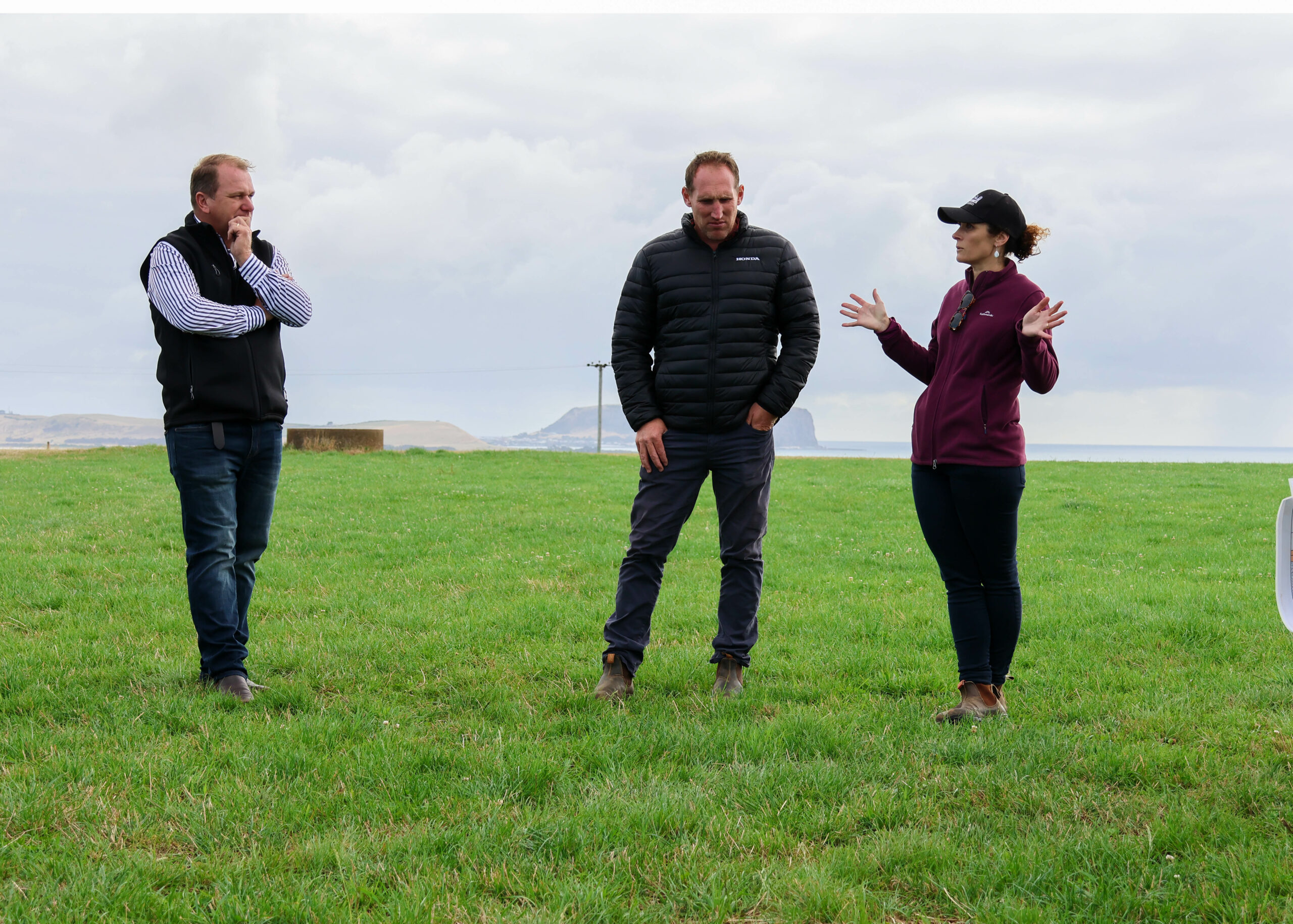
COW AND SOIL HEALTH IMPROVED
Isaac said Dan predicted they would save money on fertiliser, but because they have bought additional land and expanded their operation, it has been hard to quantify.
What hasn’t been hard to quantify is the results in their cow and soil health.
Starting with two paddocks, today the whole farm is under biological farming practice. Their annual nitrogen application within the biological regime is down to 140kg/ha (64 units of nitrogen). It also meant last year’s urea price hikes passed through without putting pressure on them.
Isaac said, “We always used to struggle in the early part of lactation to get our protein over 3%. However, last year’s peak milk I don’t think it dropped below a 3.2%. While we might not peak as high as spring-calving herds on the same regime, we are still peaking at 34 litres with stronger components.”
Where the change has been dramatic is underfoot.
“One thing we have definitely seen is a real change in our soil profile,” Isaac continued. “While it is all visual, I think it hangs on better in summer. I’m sure it’s because the soil isn’t as compact, and it can breathe. When you walk on it, it feels lighter and visually it’s crumblier when we dig into it.
“Now that we know that the air we breathe in is 78% nitrogen, it makes sense that when the soil’s pores are open it can absorb more nitrogen from the air.’’
Dan explains the science: “As dairy farmers, we are conscious of compaction from farm vehicles and hoof traffic. What many people don’t understand is that with high rates of conventional fertiliser, we actually change the soil structure making it tighter and more closed.
“Tight soil cannot breathe, and it becomes anaerobic, which favours the growth of more weed species, and through the summer that means pasture needs more irrigation water to sustain the plants.
“One of the big positives of this biological programme is that the soil structure does become more open to atmosphere, and water, which allows for an increased root depth.”
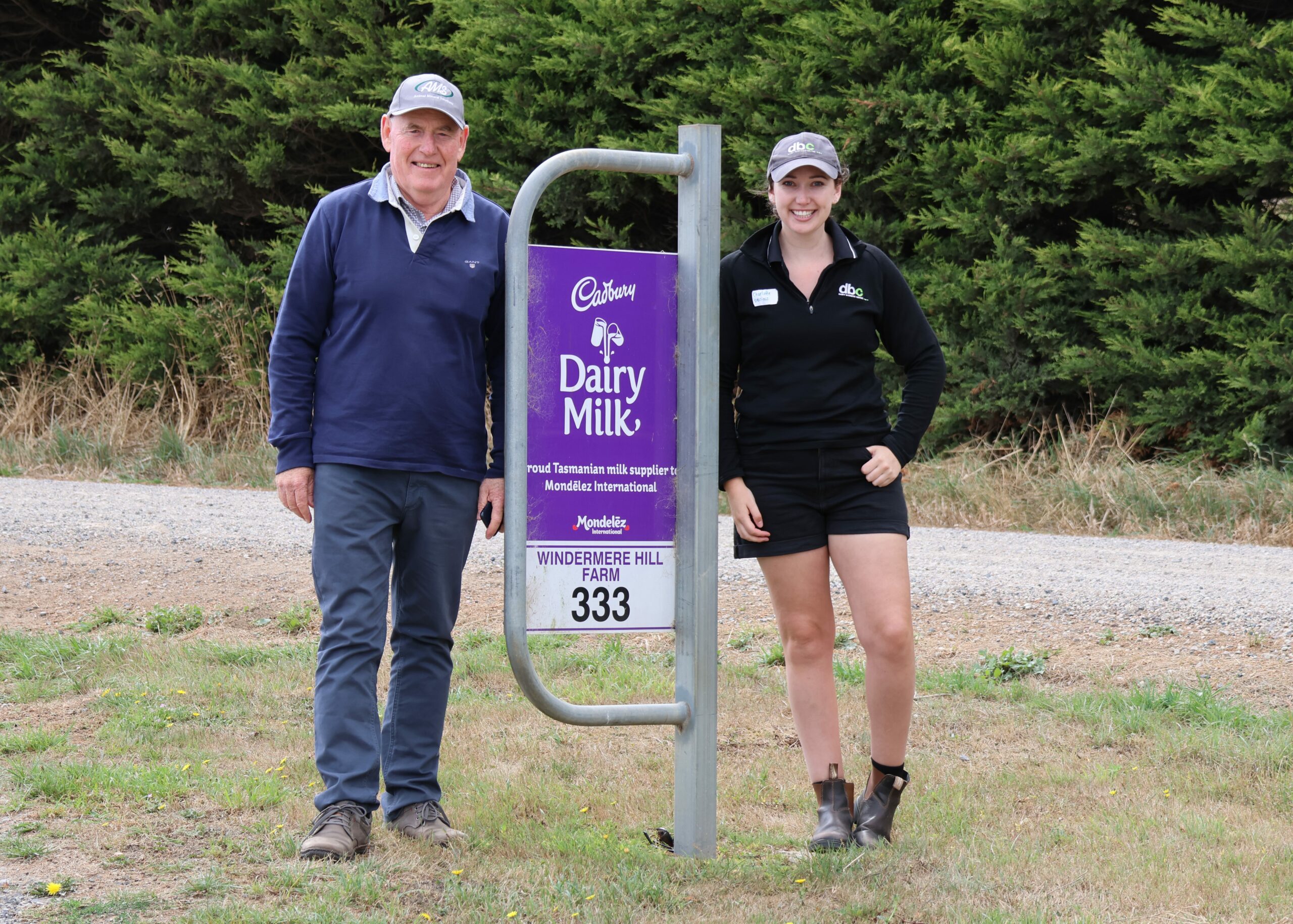
CLOVER IS BACK
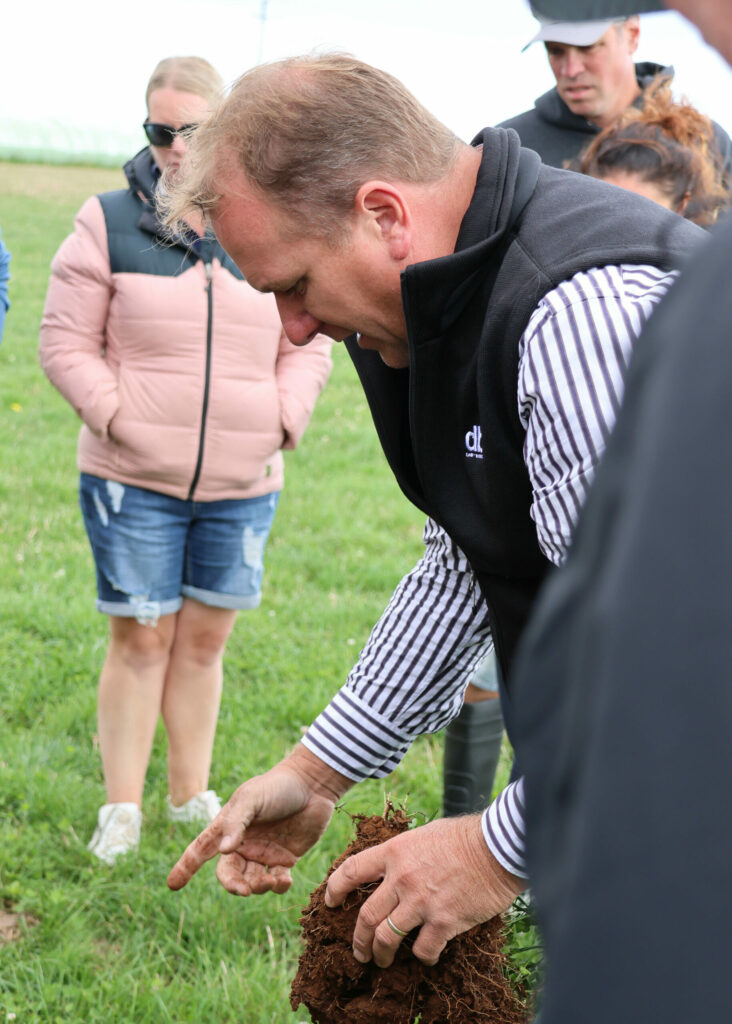
Isaac said he doesn’t miss the overwhelming smell of ammonia that used to come off the cows in the dairy after he had applied urea on-farm. It’s also meant that clover is again flourishing in their pastures.
“I’ve got a paddock up here that the cows are going into and it’s just swimming with clover. In the old days, urea used to choke the clover out and while you didn’t have to worry about bloat, you also didn’t have that high protein pasture.
“But bloat just doesn’t seem to be an issue with biological farming, and clover is a great nitrogen fixer and very high in protein. It means we don’t have to feed so much protein in our grain mix, because there is enough through the grass.
“So, we’re saving money on different grains – like lupins for example. Biological farming is a chain that keeps impacting throughout the operation in lots of ways.”
While their SCC has improved, as has their fertility, Angelique said it is hard to say how much of that is due to biological practice, because they also work hard on their genetics. They genomically test every heifer with a heavy focus on fertility and BPI (Balanced Performance Index]).
“I don’t think there is anything in farming where improvement is due to one thing,” Angelique said.
“We’re constantly looking for improvements and I guess that’s the difference for farmers who are wired that way. They are constantly looking to the future – the horizon – and what they have to do to get there.”
Isaac advises anyone considering biological farming to ease into it, adding that it has been the right move for them.
“Biological farming didn’t put our business back one bit. If you’re seeing only positive changes, why would you change back?”
IT’S COMING…
The final word goes to Angelique.
“It made sense to me to use less synthetic fertilisers, in conjunction with other changes we have made as we look forward.
“It’s the next big frontier of change, and I think in the next five years we’re going to see a lot of research results on this subject coming through.”
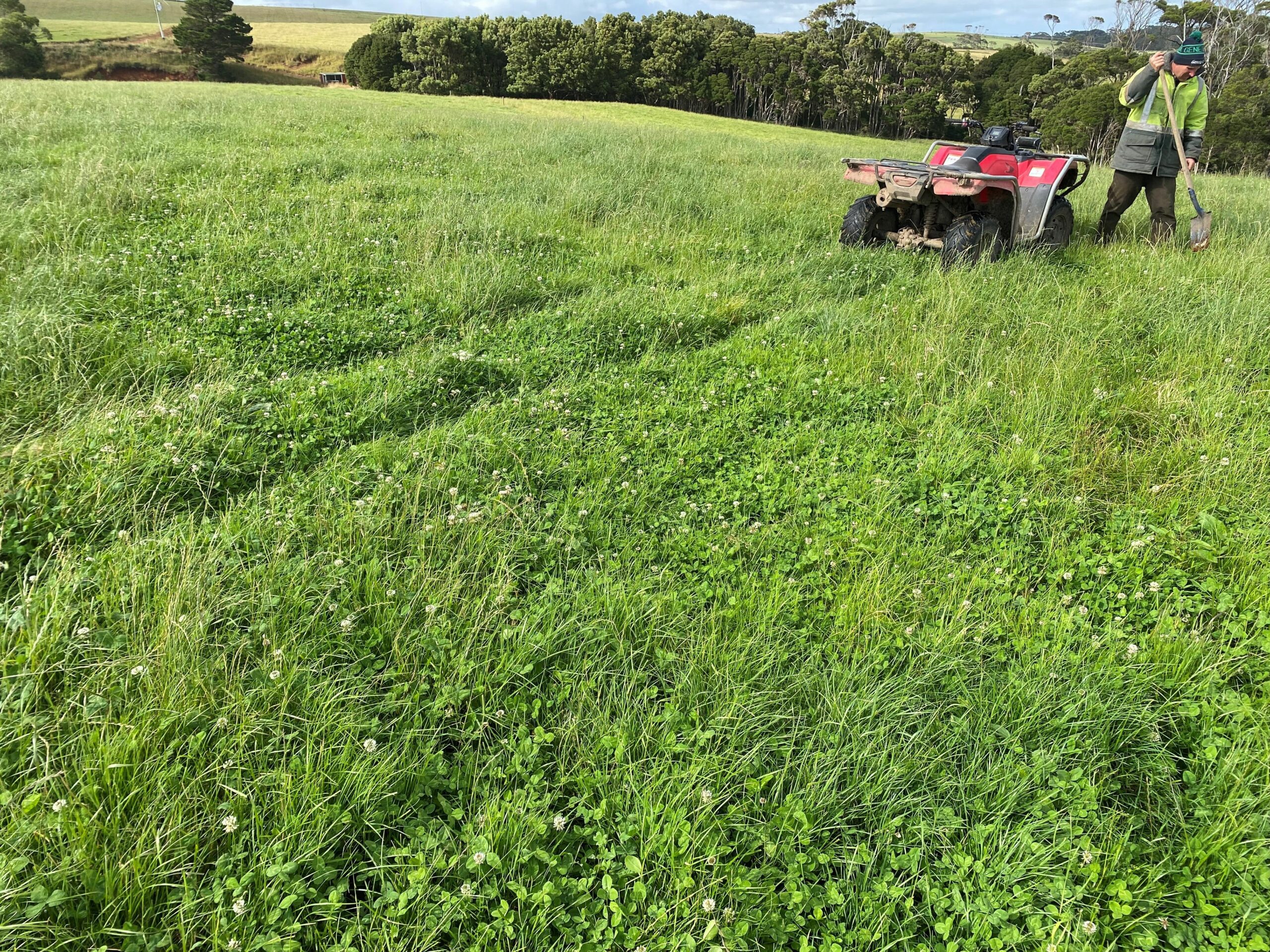
SUCCEEDING AT SUCCESSION
Isaac Korpershoek was 23 and travelling in the United Kingdom when he took the call from his father.
He was travelling with his partner (and now wife), Angelique Abbott, a Sydney-born veterinarian. The pair had no immediate plans to come home.
Peter Korpershoek told his son that if he wanted to farm, the time was now. He was ready to step down. Isaac and Angelique boarded a plane and embarked on a heavy-duty succession plan that worked because they had the capacity to endure the highs and the lows that would follow.
They agreed to pay 13% of their income to Isaac’s parents to lease the farm, and settled into their new normal for the next four years. Isaac is one of three sons – often a knotty equation when it comes to succession. And, when Isaac’s brother Luke also wanted to farm, it began another conversation.
“Luke didn’t want to kick us off,” Isaac said.
Angelique added, “Isaac and his parents went to a succession-planning session in Burnie run by a bank we didn’t use. Afterwards, Isaac literally rang me at work and said, ‘we’re buying a farm’. I was six weeks off having our second child.
“We were to create the equivalent opportunity for Luke. We had cattle agisted on a property that had stopped milking. It had been on the market, and we asked them if we could do a lease-to-purchase agreement, and that’s what happened.
“Luke, Isaac and I borrowed money with literally nothing behind us, and we had to also get the dairy ready to milk again. I was milking the day I was due to give birth, and was back milking two weeks after.”
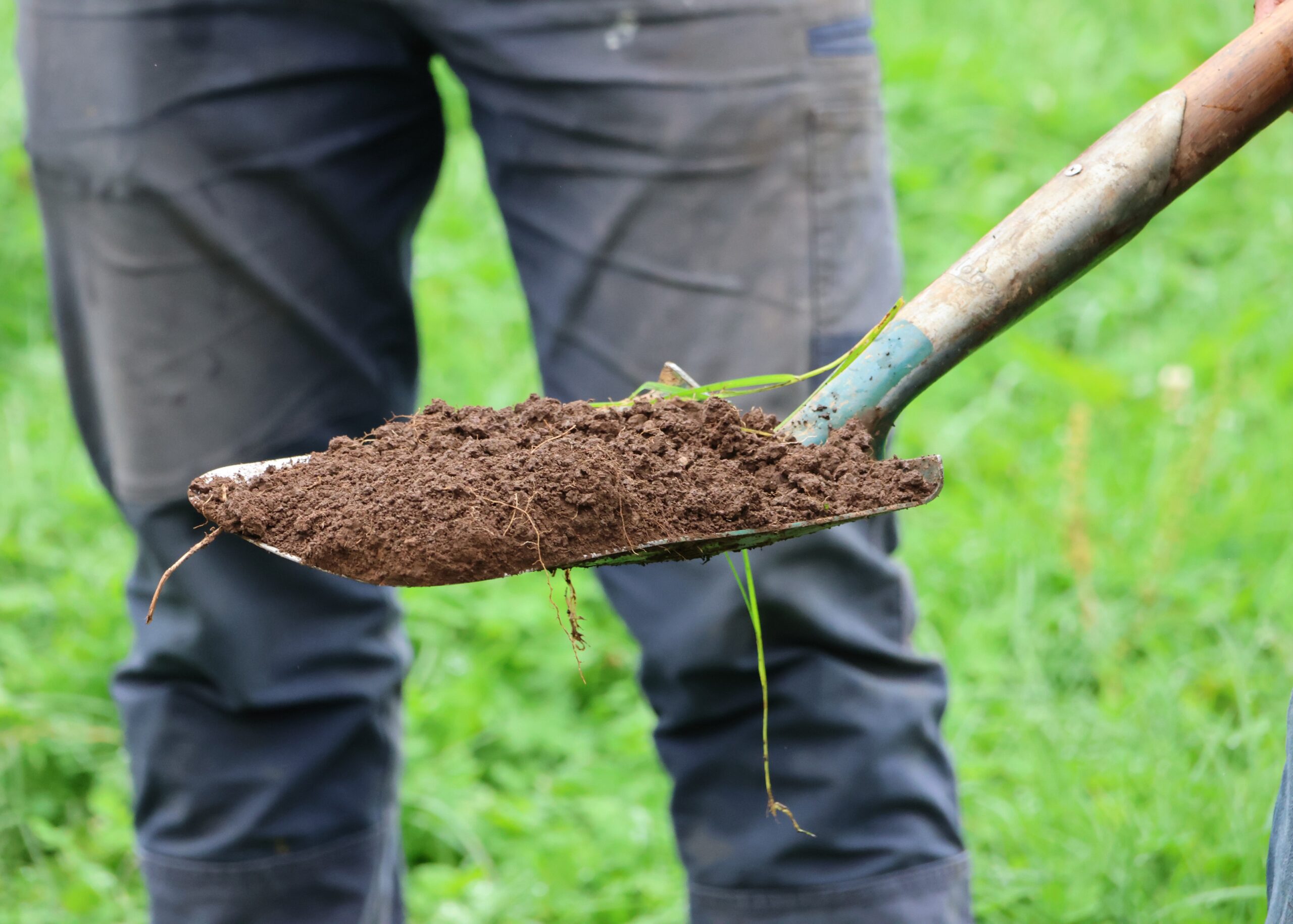
TEAMWORK MADE THE DREAM WORK
The Korpershoeks worked together in partnership for four to five years, each paying their parents 6.5% (to get across the 13% agreement). As planned, they split the partnership on April 1, in 2016. Valuations on their parents’ investment had been done, and they paid their parents out. At that time, Isaac was 32. Their third brother, Logan, an electrician, was factored in and he had several options (within a timeline to protect how far his brothers would be stretched by his decisions).
When he was ready to move on his life plans, Logan and his partner, Alexandra, decided they didn’t want to dairy, taking a slighter lesser payment (paid by Isaac and Luke) in return for not shouldering any of the ongoing debt to their parents. Luke and Alexandra bought 81ha with two cottages on it, which they have turned into highly successful Airbnbs that have been nominated in the top 10 Airbnbs (under 30) for South-East Asia.
The maths is now simple: Isaac is now 39, and all three brothers have been given the opportunity to work hard for their own future, while their parents have been rewarded for their lifework.
Isaac said, “We come home with almost nothing. We had a house, and while we now have a lot of debt, we’ve gone from nothing to 1000 acres. No-one has given us anything in terms of the financials.”
THE KEY THINGS
Angelique added, “Our advantage has been the lease-to-purchase opportunities. That gave us a leg-in and time to build equity. We were fortunate that people believed in us, and we just had to put in the hard work to make sure we didn’t let anyone down.
“It was very surreal. I’d like to say it was great. But when we settled, I was pregnant with our fourth child, and a month later the Murray Goulburn clawback happened, and it was at the end of the driest summers in history, and we had spent $180,000 on extra feed.
“We had to reset financially three times in the first 10 years of farming because of things that were outside our control. The risk for us was if we had not been able to come up with the money.
“But I think part of the reason our succession plan was successful was that we were all young enough – including Isaac’s parents – to have the energy to do it. Now we are all young enough that we will all benefit from making our own decisions around our future, and what we can do with our equity and those opportunities.”
‘DAIRY HAS BEEN GOOD TO US’
Angelique said as they look back, it has been a big family effort that has resulted in two out of three sons making their life in the dairy industry.
“It was Isaac’s dream to farm. I’m a big advocate for dairy, and I get disappointed when people say there is no future in dairy.
“Dairy has been so good to us – both in our careers and industry wise.
“When it comes to conversations around succession, I think we need to look outside the box, and not necessarily approach it in a cookie-cutter way.
“Lease-to-purchase, and the fact we were all young, was the difference for us.”
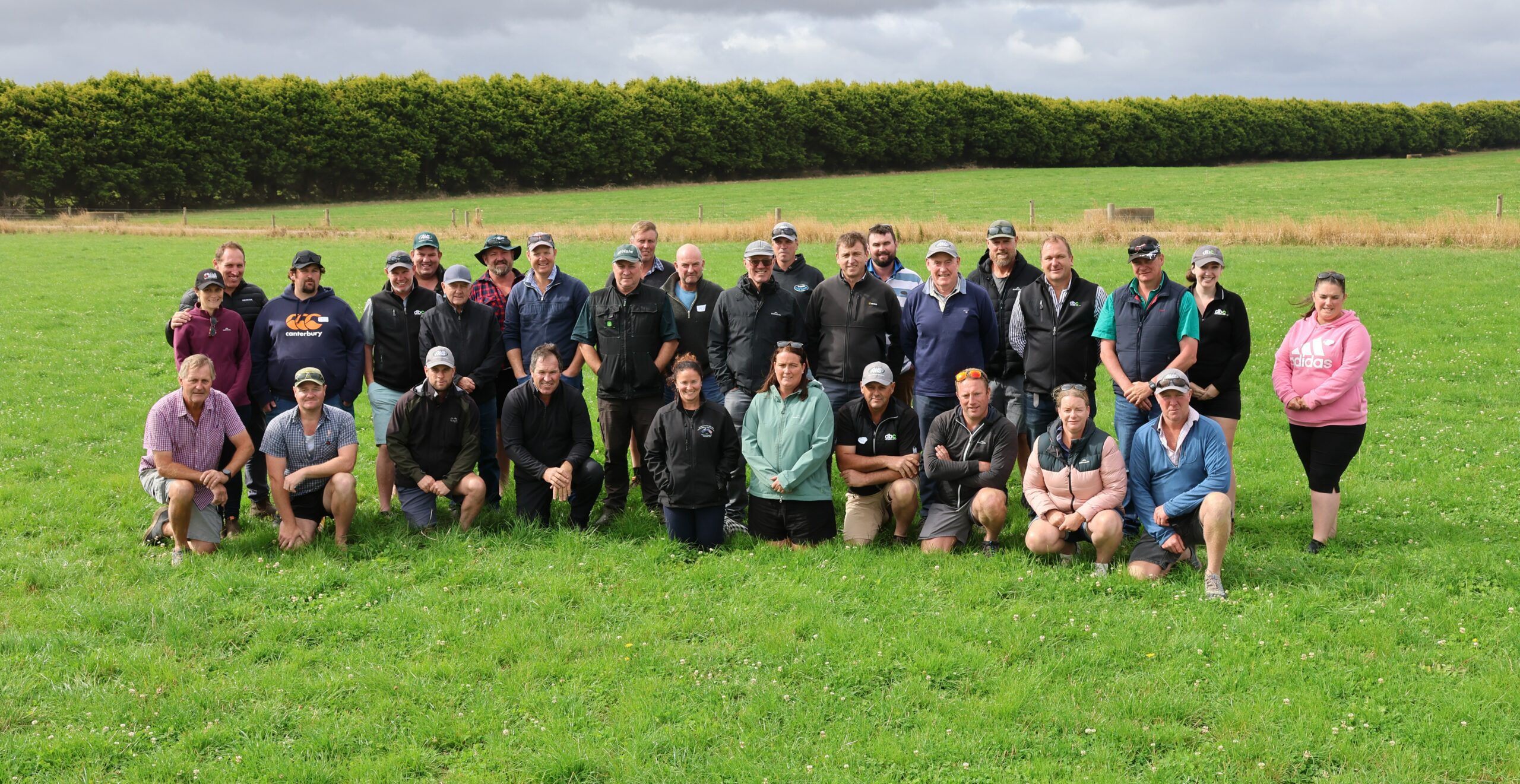
Related article
Southland dairy embraces high-performance biological farming
He came for the sustainability and stayed for the results
BMCC from 300,000 to 50,000 thanks to the soil
Related products
